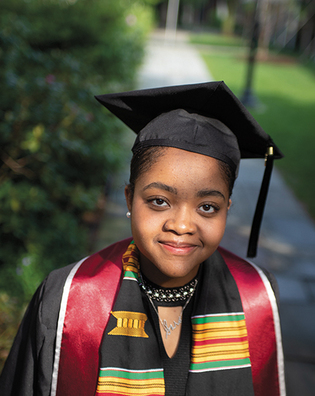
Mark Ostow
Sara Viola Speller
Raleigh, NC
Davenport College
Music
Did you come to Yale thinking you’d be a music major?
I did, actually. My band teacher was my favorite teacher, and hugely supportive. So I came in with the intention of being a high school band teacher. But then I realized I didn’t like practicing my instrument! I play clarinet, and I think it’s a beautiful instrument. But just scales are not my favorite thing. I’ve since gotten much better at practicing, but for voice.
So are you saying you discovered your voice?
Yes, quite literally. I sang in church and grew up singing with my family, but until I got here, I didn’t realize it was something I could do. Sophomore year I started training for classical voice and got really into opera. And recently I also started doing musical theater. There’s something about it that is just so vulnerable and so satisfying. But then the history of those practices, as well, are very, very cool to me.
What practices?
Of performance—musical performance history. I’m really interested in race and gender inside of music and music performance, and changes in the perceptions of characters, dependent on who is performing or who is viewing the performance.
What are your plans?
This fall I’ll be working towards an MPhil at Oxford. I got an Angela Fu Scholarship, given to one graduate student in musicology each year. It covers tuition, which is nice. That’s two years. I think I will apply for another degree afterwards, in the States, but I’m not sure yet if I want that degree to be in musicology or vocal performance.
So you don’t know if you’ll be on stage or on a podium lecturing.
I would love to do both.
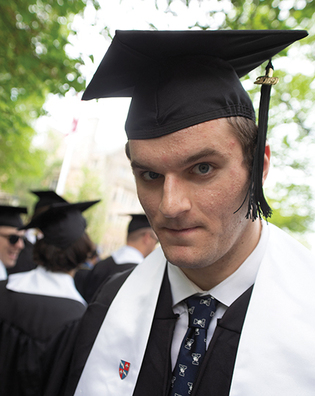
Mark Ostow
John Lager
Golden Valley, MN
Benjamin Franklin College
Political science
Why did you choose poli sci?
I tried economics. I chose to study political science because I didn't like the theoretical underpinnings of economics.
Did you travel while you were here at Yale?
No, I was here every summer because I’m a football player. So I was here working out and taking classes, and I graduated early, actually—in three years. This spring I was training for the NFL, and I’m working on an accelerated MBA at [University of] Notre Dame. I’ll play my [football] season there, and then I’ll join the NFL in the spring—and see how that’s going to work out.
Given what’s come to light about the hazards of football, do you worry about injuries?
I think NFL really stands for “not for long.” And that’s why I chose a place like Yale and that’s why I’m going to Notre Dame.
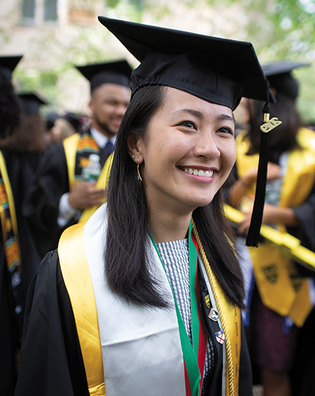
Mark Ostow
Minh Anh Nguyen
Portland, OR
Ezra Stiles College
Political science
Has Yale been what you expected?
I was a fan of the residential college system: I had the idea it would be like houses at Hogwarts! But I didn’t realize how important it would become for my life. Many of my friends are in my residential college, and my dean and my head of college are incredibly supportive, and this year, as a FroCo [freshman counselor], I got to see the behind-the-scenes work of building a community, and how intentional we have to be in fostering the positive space that Ezra Stiles is for me.
What will you do next?
I’m going to teach middle-school math for Teach For America in Seattle. Down the line, I’d like to be a principal.
Why a principal?
Once a teacher has a great idea, she needs resources and support to make it happen. The principal and school leadership team are the people who support new ideas.
You recently went back to Vietnam, where you were born. How did your education affect that visit?
I had so many questions about how the society functions, and how inequalities are created and why they exist in a country like Vietnam. Yale taught me to question. Why do things exist this way? What is the other narrative?
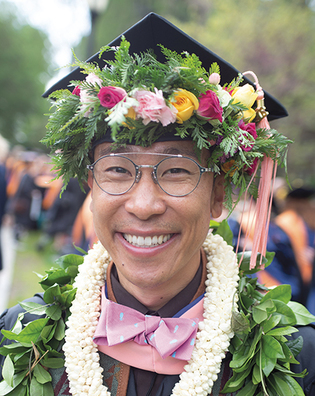
Mark Ostow
Ka`imi`āina Masunaga
`Āina Haina, HI
MPH, School of Public Health & School of Management
You already have a medical degree. What aspect of your master’s program was most significant for you?
I spent a lot of time studying History of Medicine with Dr. Carolyn Roberts—a historian who is also trained as a Shakespearean actress. She inspired me to look beyond a myopic clinical lens and seek out the forgotten voices of people of color and sexual minorities. In the Beinecke, I was able to discover slave traders’ journals and slave surgeons’ letters back home that describe their experiences, and also describe the commodification of and experiments on black bodies. I saw how that has stained the fabric of today’s health-care system—triggering the aversion of many marginalized people to the white doctor in the white coat.
The flowers you’re wearing smell delicious.
My Mommy brought them from Hawai`i, and she sewed them and wove them last night. They are green maile lei from Kaua`i, and white pikake lei.
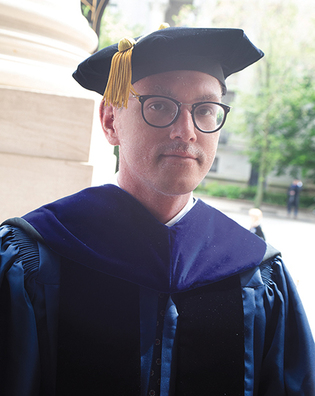
Mark Ostow
Samuel J. Loncar
Harrisburg, PA
PhD, Religious Studies
How did you get interested in philosophy and religion?
I had the dramatic experience as a teenager of discovering Plato. I read this short dialogue, the Crito, and it was beautiful. It was Socrates making an argument about why he should die. I was so moved: what kind of person is this, who is so committed to truth and justice that they would argue not to escape prison? This became the marrow of my life’s concerns, this way of living that is so deeply committed to reason, and at the same time, so pious.
What’s next?
I’ll be building a nonprofit institution based on a magazine I run called the Marginalia Review of Books. We connect the culture of knowledge from academic insights with the broader culture that is interested in journalism, arts, and religion. We try to push academics to ask, “Why does my work matter?” We have over 100,000 readers.
My first academic book is currently with an editor, and this summer I’m teaching a course at Yale called Are Humans Becoming Gods? Technology, Science, and Faith in a Posthuman Age. I don’t know the answers. I’m a specialist in questions.
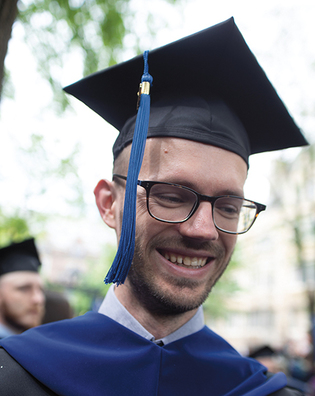
Mark Ostow
Joachim Hubmer
Eferding, Austria
PhD, Economics
What have you been studying?
I’m interested in income inequality. We have been witnessing a big increase in inequality, and the big question for us economists is trying to find out what’s going on. What are the underlying drivers of these developments?
And what are they?
There are a lot of factors, and it depends on the dimension of inequality you’re looking into.
Why does inequality interest you?
I think it’s important for the future of our democracies and for society. It might create political troubles. So far I have been asking the positive question of why it is the case, as opposed to what should we do.
What was the hardest thing about graduate school?
The hardest thing was to transition into research from classwork. In all your previous education, your creativity is not really fostered. And then all of a sudden you’re supposed to come up with your own questions, and answers for those questions.
What did you do in your free time?
I played soccer, and I was running marathons. In 2017, I was in New York, and this year I did Boston.
You have to qualify, right?
Exactly. [For New York] there was a lottery. I was very lucky, and I qualified. I did 2:58; in Boston, not as well. I didn’t have as much time to prepare this year, because I was on the job market.
What’s next?
I’m going to join the faculty of the economics department at UPenn in the fall.
Congratulations.
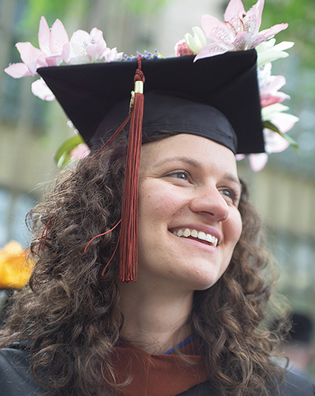
Mark Ostow
Courtney Durham
Washington, DC
MEM, School of Forestry and Environmental Studies
How do students at FES minimize their environmental impact?
You won’t see many students without a Tupperware, or reusable utensils, or their mug. And when they get to travel to these really cool places for research or for conferences, they’re offsetting their flight emissions by buying carbon credits, through the airlines or from a third party.
Which one do you recommend?
The best one is The Good Traveler.
How much of the responsibility for curtailing climate change falls to individuals?
All the levels have to work together: The soul of this change comes from the people, but you need the policy making that national and state governments can bring. And you also need the purpose-driven folks—the local communities and NGOs—and you need the profitability, innovation, and scalability for technologies and resources that the private sector can bring. It has to be kaleidoscopic.
What will you do next?
I’m going to work for The Pew Charitable Trusts as a senior associate for coastal wetlands and coral reefs. Our big objective is to help developing countries add those sectors to their national plans for climate actions, like preserving or replanting mangroves—policy options that they can bake into national plans legally required by the Paris Agreement. The cool thing about coastal wetlands is that they can sequester more bad emissions out of the air than a lot of other ecosystems. Also, from a disaster risk-reduction perspective, mangroves can dissipate 70 percent of waves and reduce the threat of a storm surge. And mangroves help local communities with fisheries. Where the fresh water is meeting the saltwater, those are super active ecosystems.
Anything else?
I have loved FES: the sense of community and the willingness to take on difficult conversations. I have loved every second of it.
 loading
loading